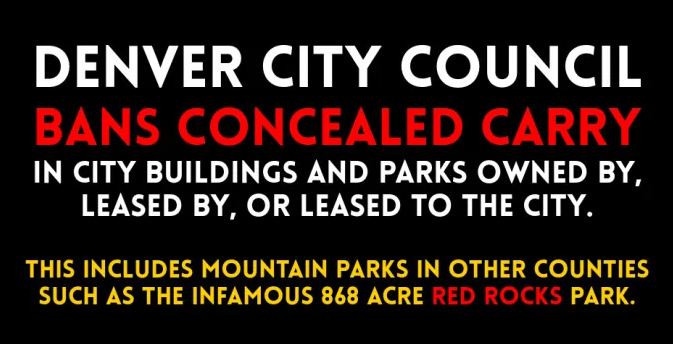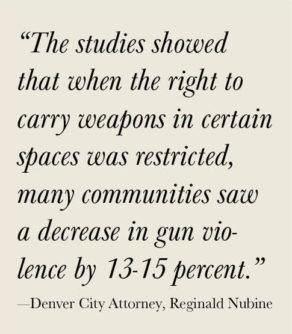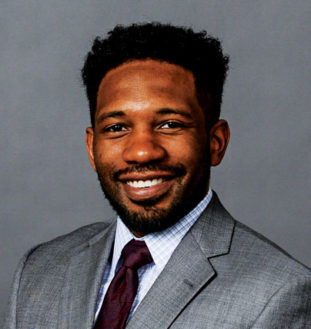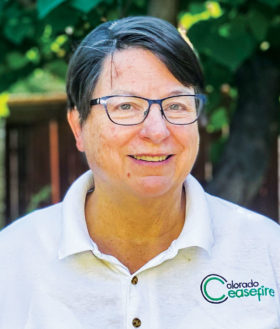
Rally for our Rights, a Second Amendment rights group, posted this sign on their website along with an article expressing concerns that the parks ban affects thousands of acres of parkland outside of Denver city limits. The Jefferson County sheriff, where Red Rocks Park is located, has already made it clear that he will not enforce the concealed carry ban. From the website rallyforourrights.com
 The stream of tragic mass shootings and the rising rates of gun violence have intensified the calls for local lawmakers to pass meaningful gun safety legislation. In May, Denver implemented a concealed carry ordinance to prohibit guns in city buildings and public parks. Designating certain types of locations as sensitive spaces where guns are banned has yielded significant decreases in gun violence in other cities.
The stream of tragic mass shootings and the rising rates of gun violence have intensified the calls for local lawmakers to pass meaningful gun safety legislation. In May, Denver implemented a concealed carry ordinance to prohibit guns in city buildings and public parks. Designating certain types of locations as sensitive spaces where guns are banned has yielded significant decreases in gun violence in other cities.
How might the recent Supreme Court Ruling in the Bruen case, which struck down a New York gun control law and limited the ability for states or cities to prohibit firearms in public, impact Denver? Will it result in pressure on the City to repeal the public parks ban and prevent the City Council from expanding the sensitive space strategy? An explanation of the concealed carry ordinance, the benefits of the sensitive space strategy, and the implications of the Supreme Court ruling follow.
The Concealed Carry Ordinance
Denver’s crime data shows that rates of gun violence have been rising for over a decade—and accelerating in the post-pandemic era. As of June 2022, gun violence rates in the city had increased by a record 73 percent from the previous three-year average. Between March and June, three people in NE Denver were injured and one was killed in shootings.
In 2021, the rising gun violence rates, combined with the Boulder King Soopers shooting, motivated the Colorado Legislature to pass a gun safety package that included six bills. Senate Bill 21-256 was especially transformational. It repealed a 2003 preemption law that prevented cities from passing any gun regulations that were considered more strict than the standards established by the state. Repealing this preemption law suddenly granted local governments the autonomy to implement specific gun safety regulations deemed best for their cities and desired by their residents.

Reginald Nubine, Senior City Attorney for the Denver Office of Prosecution and Code Enforcement. Photo courtesy of Reginald Nubine
Denver City Attorney Reginald Nubine, who wrote Denver’s recent ordinance to ban guns in parks and city buildings, says “Right after it [SB 256] passed, we began thinking about ways to handle the gun violence that is occurring in our city. Back in 1996, we already had legislation that prevented people from carrying weapons in parks, so we’re literally going back to what we had before the preemption law passed in 2003. We’re seeing a lot of shootings in our parks. We also wanted to make sure government buildings are taken care of—and so we identified those as sensitive spaces.”
“We looked at a bunch of data on sensitive spaces,” says Nubine. “The studies showed that when the right to carry weapons in certain spaces was restricted, many communities saw a decrease in gun violence by 13-15 percent. So our research shows that when you have these gun-free zones, it makes the community safer—and that’s really what this bill was about.”
Existing gun permit requirements have focused on limiting the number of people who can purchase guns. The sensitive spaces ordinance has added a focus on reducing the number of places where people can carry guns.
The Benefits of Sensitive Space Legislation
The ability to ban guns in sensitive spaces and the decision to move forward with the ban in public parks is significant for Denver. The city has 270 urban parks and 14,000 acres of mountain parks. Northeast Denver has an abundance of parks including Central Park, City Park, Great Lawn Park, Montclair Park, Mayfair Park, and numerous smaller parks. Banning guns in these locations may also reduce the number of guns in stores and restaurants after visitors leave the parks.

Eileen McCarron, President of Legislative Operations at Colorado Ceasefire. Front Porch photo by Christie Gosch
“The problem with bringing guns out in public is that arguments can escalate into shootings,” says Park Hill resident Eileen McCarron of Colorado Ceasefire, an organization that attempts to reduce gun violence by promoting gun violence prevention policies in the legislature and by raising awareness about the dangers of gun violence throughout the state. “In parking lots [people] get road rage, or at bars they get into fights, and because the gun is handy, someone ends up dead, another ends up in prison, and both families are destroyed.”
The sensitive spaces policy can also enable Denver to add more places to the list in the future. Boulder recently implemented a comprehensive list of sensitive spaces that resembled the more extensive bans that have been enacted in New York and its neighboring states. “Boulder now has the strongest gun ordinances in Colorado,” says McCarron, who would support future additions to Denver’s list including bars, restaurants, stadiums, theaters, hospitals, daycare centers, churches, and mental health or drug treatment centers.
The Implications of the Supreme Court Ruling
The recent Supreme Court ruling in the Bruen case, however, might have jeopardized the ability for Denver to enact public park bans and add more areas to its sensitive spaces list.
In the majority opinion, Justice Thomas said that the Second Amendment includes the right to bear arms outside of the home and that sensitive spaces should be supported by historical analogies. This raises questions regarding where guns can be prohibited in a given community, and many gun rights groups are using the ruling of the Supreme Court to challenge the validity of sensitive spaces. In July, the Rocky Mountain Gun Owners (RMGO) filed a lawsuit against the Town of Superior to challenge its new gun ordinance, which includes a public park ban and other gun safety policies. A federal judge sided with RMGO, saying “in Bruen, the Court concluded that the Second and Fourteenth Amendments protect the right of ordinary, law-abiding citizens to carry handguns publicly for self-defense.” Taylor Rhodes, executive director of RMGO said the ruling “is a massive win for gun rights in the state of Colorado.”

Rep. Jennifer Bacon, Colorado State Representative for the 7th District Area of NE Denver. File photo by Steve Larson
Gun rights groups are also expected to challenge the Denver parks ban by arguing that the Supreme Court ruling grants them the right to carry their guns in public and that parks do not qualify as sensitive spaces. “I think that we’ll certainly see lawsuits in municipalities with bans,” says State Rep. Jennifer Bacon, who represents the 7th District area that includes most Northeast Denver neighborhoods. A lawsuit would require a judge to determine whether Denver is justified in identifying public parks as sensitive spaces. Denver City Attorney Reginald Nubine justifies parks as sensitive spaces “because we know that these are places where we’re seeing lots of gun violence. These are places where people congregate, where kids play, and where we have restricted guns in the past.”
Another potential detriment created by the Supreme Court ruling is that the threat of lawsuits from gun rights organizations could intimidate cities from passing gun safety laws and expanding sensitive space lists. “But I hope Denver still goes forward…not being held back by the fear of legal challenges,” says McCarron.
“At the legislature, we’ll vet with different lenses when we move some of these gun control bills,” says Rep. Bacon. “But gun control supporters are willing to do the work, cities are willing to be sued, and we are still willing to write beneficial gun laws for our constituencies…I don’t think the communities will be okay with a small minority of people undoing their progress.”
City Attorney Nubine says “At this point we’re still researching the Bruen decision and getting our ducks in a row. The opinion was pretty broad and it changed the standard for how we interpret Second Amendment cases. So we’re going to conduct research on the decision of the Supreme Court, follow the developments of the Superior case, and then see what the situation looks like here in Denver.”




The issue seems to be enforcement. How do you enforce gun free zones without “stop and frisk?” Or maybe metal detectors? The perennial objection to “magical barriers” is that only compliant citizens will comply.